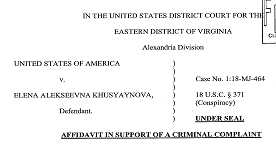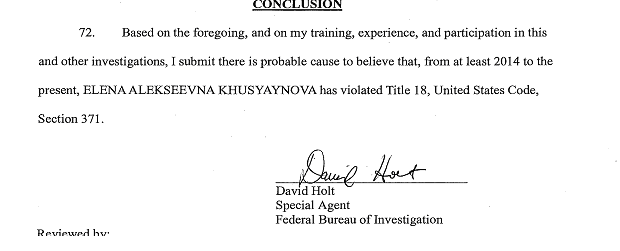Alternative Insight
The New York Times Betrays Readers Again
Another Russian Bashing
What has happened to the New York Times (NYT) - a newspaper once known for its integrity and honest journalism? Evidently, disclosures of the deceptive reporting in a previous NYT article, The Plot to Subvert an Election - Unraveling the Russia Story So Far by SCOTT SHANE and MARK MAZZETTI, SEPTEMBER 20, 2018, has not persuaded the newspaper to be more careful with the facts. Examine its latest infomercial on the subject.
Misrepresentation starts with the headline of an Oct. 19, 2018 article by Adam Goldman: "Justice Dept. Accuses Russians of Interfering in Midterm Elections." Well, not exactly. The New York Times headline erroneously characterizes a Criminal Complaint made in Virginia by one person as a Justice Department accusation of interference in Midterm elections. Shown below are the introduction to the Complaint and its conclusion.
Note that this is not an indictment but a Criminal Complaint. In an indictment, sworn testimony is given under oath, while a complaint is a signed affidavit by the accuser. This accuser is not the Justice department; it is one FBI agent, who is a member of the Justice Department. He has filed the complaint with only probable cause against one person, which means he may have insufficient information to have this person indicted.
Justice Department involvement occurs after someone originates a Complaint, in this case one of its own personnel. The department provides a prosecutor for a court to hear the complaint.
What is the Complaint?
The above narrative only analyzed the headline, which the NYT editorial department designs, and is not a fault by the journalist. Proceed to the body of the article and the journalist, Adam Goldman, reveals another fault in the headline and takes a few hits by not correctly summarizing the Complaint.The woman, Elena Alekseevna Khusyaynova, 44, of St. Petersburg, managed a multimillion-dollar budget for the effort to "sow division and discord" in the American political system, according to a criminal complaint. She bought internet domain names and Facebook and Instagram ads and spent money on building out Twitter accounts and paying to promote divisive posts on social media.
Does this Complaint against one person have much to do with the Midterm elections? The Complaint mentions some ads concerning candidates, but the article states that the ads did not favor any candidate or political Party.
But this time, prosecutors said the operatives appeared beholden to no particular candidate. Russia's trolls did not limit themselves to either a liberal or conservative position, according to the complaint. They often wrote from diverging viewpoints on the same issue.
Although there is only one Complaint against one person, note that the writer uses the plural in prosecutors. Why is this only a complaint? Is it because there is no assurance that any laws have been violated -- cannot most anyone have a Facebook account? Are the Russian exaggerated narratives much different from the millions of other exaggerated narratives that diminish the credibility of Facebook news reports? Attaching the "sow division and discord" effort to the Midterm elections is a leap by the complainant who hopes the bind can provide an avenue for legal action.
Another lapse -- "Elena Alekseevna Khusyaynova, 44, of St. Petersburg, managed a multimillion-dollar budget for the effort to 'sow division and discord' in the American political system." The writer does not mention that only a small portion of the multimillion-dollar budget is destined for America; the rest being used in Ukraine, European Union, and mostly in Mother Russia. The Complaint reveals thatStarting at least in or around 2015, the Conspiracy began to purchase advertisements on online social media sites to promote events and social media groups it controlled. These expenditures were included in the budgets that KHUSYAYNOVA submitted to Concord. For example, between approximately January 2018 and June 2018, KHUSYAYNOVA compiled and submitted to Concord expenditures of over 3.7 million Russian rubles (over $60,000 U.S. dollars) for advertisements on Facebook and over 385,000 Russian rubles (over $6,000 U.S. dollars) for advertisements on Instagram. Over that same timeframe, the budget also included expenditures of over 1,100,000 Russian rubles (over $18,000 U.S. dollars) for "bloggers" and "[d]eveloping accounts" on Twitter Additionally, the budget included expenditures for "[r]enting software for social networks," including payments for services to manage Twitter posts and generate additional followers (preliminary translation of Russian text).
Believing that expenditures on social media of under $100,000 in six months can add to the polarization of an already mixed up and polarized nation does not sound reasonable, especially when the nation has a president, who, by act and speech, daily increases the polarization and discord. Read the NYT and learn of the animosities between black and white communities, between liberal and conservative communities, between the two major political Parties in Congress whose members rarely cross the aisle. Anyone who watched the Kavanaugh hearings must know of the severe disagreements and separateness that inflict American society. Once the boiling point is reached, is there any value in increasing the heat?
Russians working for a close ally of President Vladimir V. Putin are engaging in an elaborate campaign of "information warfare" to interfere with the American midterm elections next month, federal prosecutors said on Friday in unsealing charges against a woman whom they labeled the project's "chief accountant."
The first sentence plants in the reader's mind that President Vladimir V. Putin is involved in this escapade, and that this is "an elaborate campaign of 'information warfare' to interfere with the American Midterm elections," when only an in elaborate $60,000 has been spent on Facebook, and nothing in the effort indicates a Putin involvement. A later sentence pushes deeper into the mind the concept of Putin involvement.
She worked for several entities owned by Yevgeny V. Prigozhin, a Russian oligarch sometimes known as "Putin's chef" who was among 13 Russians indicted in February by the special counsel, Robert S. Mueller III, on charges of interfering in the election two years ago.
Yevgeny V. Prigozhin is one of hundreds of Russians who own a restaurant that may have one day served President Putin and does business with the Russian government. "Sometimes known as 'Putin's chef,'" clarifies he has not much relation to Vladimir Putin. If he had, he would always be known as Putin's chef and the words "Putin Chef" would not be in quotes.
After planting in the reader's mind President Putin's association with the Complaint, the writer casually turns no known association into evidence of Putin being involved in a huge conspiracy.The operation detailed in the complaint was the latest evidence that Mr. Putin had brushed off a broad Western campaign aimed at deterring Russian intrusions in Europe and the United States.
Besides not showing evidence in the Complaint of any attachment of President Putin to any campaign, the writer has neglected one point that contradicts the assertion -- the Complaint indicates that most of the funds distributed by accountant, Elena Alekseevna Khusyaynova, have gone to similar campaigns in the Russian Federation. Is it plausible that President Vladimir Putin would support the operations of an organization that "sows division and discord," in the Russian Federation?
One outcome of this story: If available, consult the primary source (The Complaint) rather than relying on the secondary source (NYT). Another outcome to the story: The New York Times may want to search itself and determine the role it is playing in engineering international discords and unduly confusing American voters. How the mighty have fallen.alternative insight
november 1, 2018HOME PAGE MAIN PAGE 
alternativeinsight@earthlink.net

